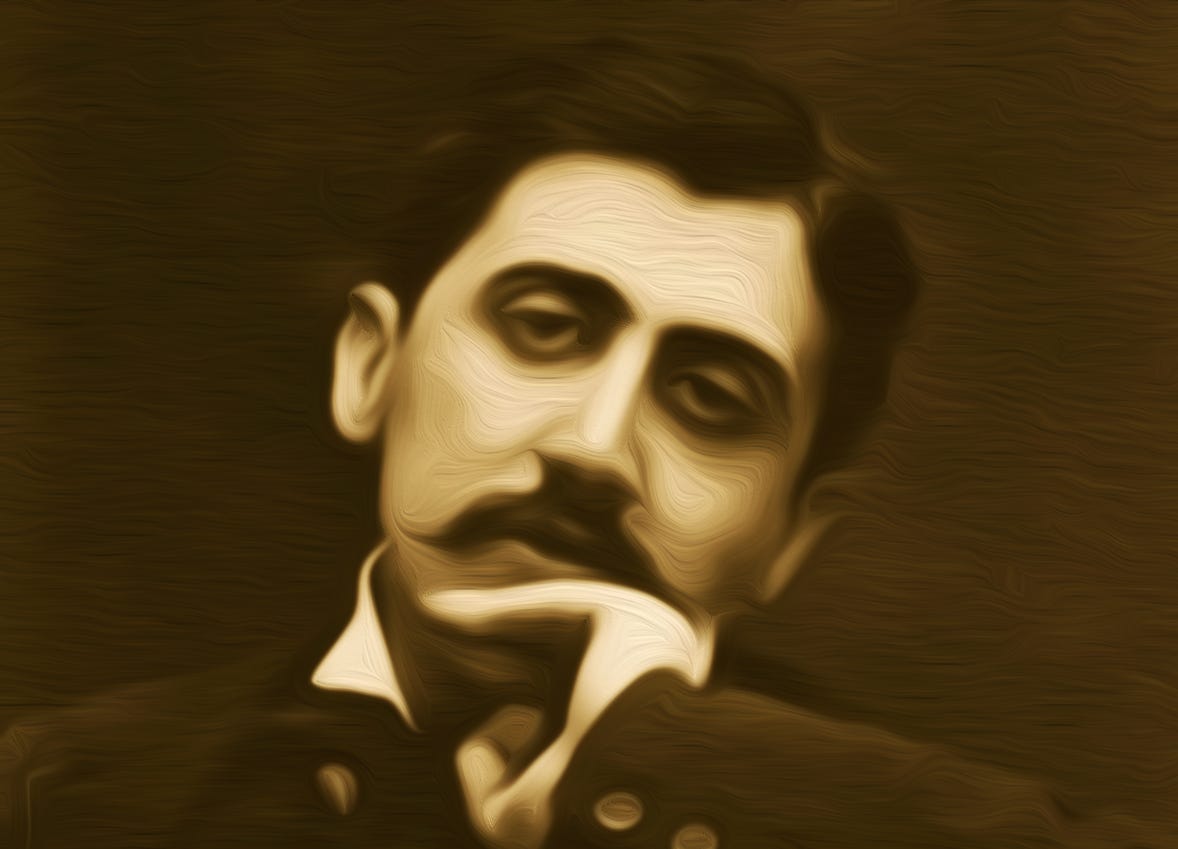3. I guess every novel begins with...
The third instalment of 'Oh, That More Such Flowers May Come Tomorrow' in which our hero finally begins his quest.
I guess every novel begins with that peculiar process of acclimatisation, whereby we find ourselves having to adjust to the idiosyncrasies of authorial style…
You might think this adjustment would be even more pronounced, even more onerous, with a writer like Marcel Proust, such is his difficult reputation. But this wasn’t my experience at all. I found my entry into the Proustian universe to be disarmingly rapid; something I can only put down to those famous Byzantine sentences of his, which, because they require great attention, possess the power to draw the reader into his world completely.
This need for sustained concentration produced in me another unanticipated effect: almost immediately, and without really thinking about it, I found myself taking notes; jotting down thoughts and impressions in the margins, on the inside covers, in notebooks, on train tickets, or on whatever scrap of paper I had to hand; underlining phrases, sentences and entire paragraphs or passages that stood out (of which there were many).
It was only much later that I came across a line by Clive James in a short essay on Proust, which read: ‘À la recherche exists to be annotated.’ He’s right. And so, every word I’ve put down since has been a product of the scribbles I felt compelled to make back then. I suppose this means the thing you’re reading is a sort of extended footnote; an example of words breeding more words, which is one of the things they do so well, for better or worse.
In this initial rush of febrile enthusiasm, I found that having started, I couldn’t stop. Perhaps this really was the medicine I hoped it would be. I’d never felt so absorbed by a book, so completely hooked into a narrative, or so utterly consumed by a fictional world, as this.
Bewitched, I read greedily, whenever and wherever I could. I read on my way to work, part of the human filling that packed the early morning tube – flanked by customer service assistants and corporate lawyers, squeezed between the bankers, barristers and baristas who made London tick; a reluctant corpuscle caught in the city’s circulatory system, still heavy with sleep.
I read in the corner of the staff canteen at lunchtime; sitting alone with a supermarket sandwich, while my colleagues conversed about quarterly budget projections, key performance indicators, and the various phases of the marketing funnel. Later, freed from the shackles of Excel, I’d wander along the canal, find an empty bench, and sit reading in the cold, too lazy or anxious to struggle home through the crowds, staring at the page until the light faded and I could hardly see the words, before descending beneath the city once more, to make the morning journey in reverse. There, amid the Potterheads and Fifty Shades fans, between stories of girls on trains or with dragon tattoos, I’d cling resolutely to Proust, my Belle Époque litterateur, a century dead, but somehow still so vitally alive.
What was remarkable to me in those first weeks and months was that his words spoke so clearly to the essential paradox of lived experience, constantly flipping expectation and reality, offering new ways of seeing things I already knew, and tantalising glimpses of things I didn’t. A peeling back of the familiar, the everyday, to reveal the unseen textures and sinews that lay beneath reality’s opaque flesh. An unveiling of the ineffable realm which stands behind the material world.
This reversal – between imagined and perceived reality – is one of the first things the attentive reader discerns in Proust – and is one of his great themes. This duality applies to the book itself, as well as its author. It’s perhaps too easy to buy into the misconception that Proust was a mere dilettante, when nothing could be further from the truth. Worse, that his novel is so rarefied or difficult, that it’s best to steer clear of it if one doesn’t want to be considered pretentious or desperate to impress.
In fact, it’s just the opposite. In Search of Lost Time is a book for throwing yourself into with abandon; it’s for scribbling in the margins of, laughing along with, getting lost in, staring dumbstruck at; it’s for shouting about, celebrating, and foisting upon your friends with evangelical glee.
Its ambition is so extraordinary, so outlandish, that to my mind, it should be regarded as the ultimate experience of reading a human being can have while animate and literate on this planet. And I can say this now with some conviction, having read it several more times. I remain excited at the thought of picking it up, still mindful of its yet undiscovered treasures, still overcome by its audacity and scale.
Need to catch up on previous instalments? You can find links to all the previous chapters here.



Hi, Ben. I'm convinced! And want to try what I have also seen as impossible...or thought I had to read Proust in French. What is considered the best translation? Are there many? THANKS.
Hey, if I don’t comment now, the moment will pass…so even though this isn’t particularly thought through…I love much if what you say so well here.
I love the duality of Proust. I actually am really into the idea of him being seen as a queer dilettante obsessed with society while also writing this extraordinary insightful and fascinating book. Just as you say, every time I pick it up (which is like every day) I am excited at the thought of the experience waiting for me of becoming intricately involved in sentences and words and paragraphs, of the world he writes, of the peeling back by that intricacy (which is a huge feat on his part). I could go on…and one…just like him, really.